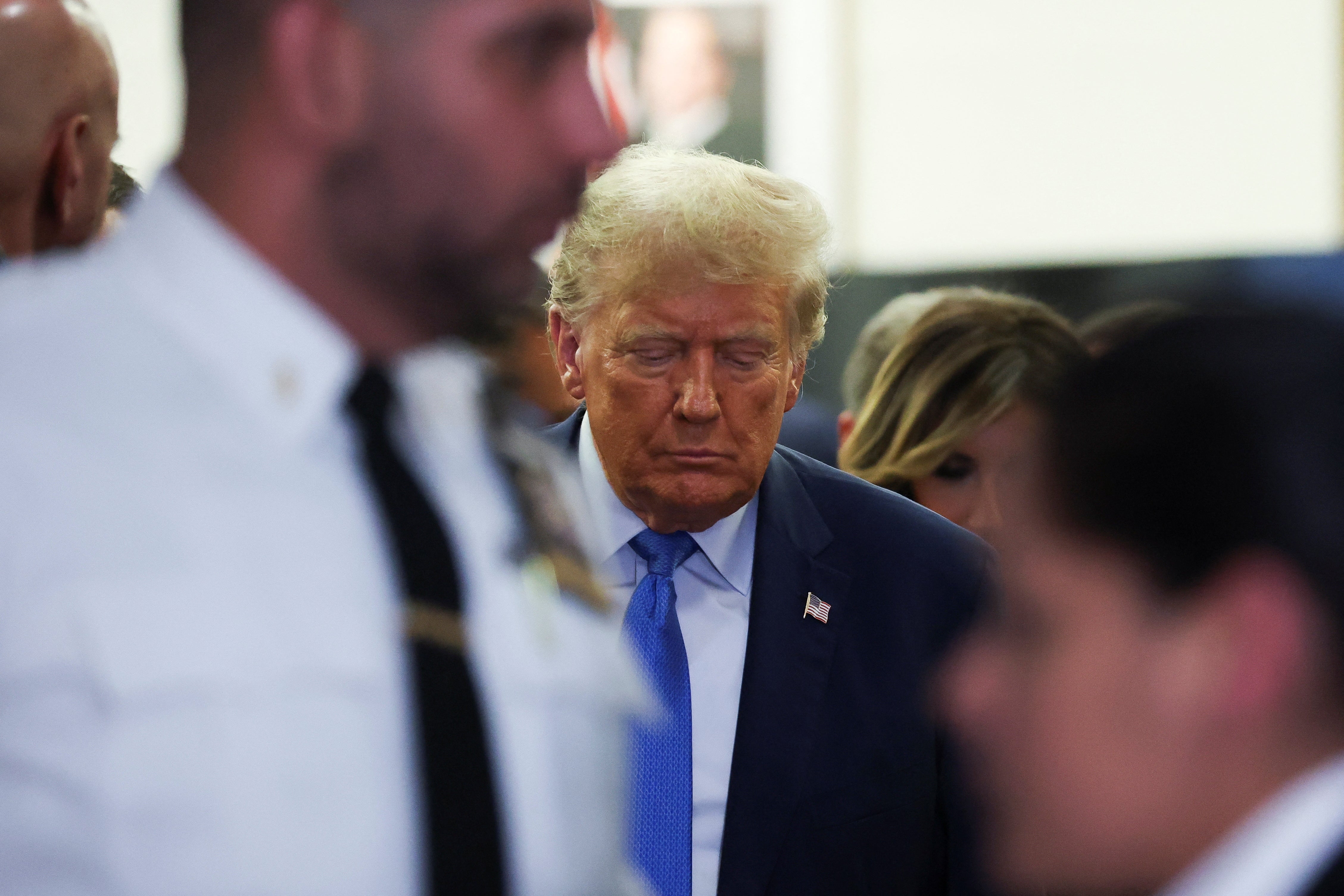Whinging into the void on the Day of the Don
Donald Trump’s day in court produced a chaotic fog of half-finished insults and cries of witch hunts, meant for an audience who weren’t there. Alex Woodward watches the former President howl and rage regardless


Former president Donald Trump’s day on the witness stand was always headed this way: belligerence and disdain for everyone and everything around him.
This time, the cameras were steps outside the courtroom. There was no one to impress, no one to cheer him on, and only a roomful of his perceived enemies – lawyers and journalists – staring back at him.
Over the last six weeks, Trump has relied on a courtroom in lower Manhattan as a campaign platform to spin a trial targeting his vast real-estate business into evidence of a political conspiracy against him. For nearly four hours on the witness stand on Monday, he got his biggest stage yet, and he stood on it alone.
Trump was under oath, but his testimony was more about performance than truth. He evaded answering questions with meandering responses that found their way to insulting the person asking them, the judge presiding over him, and the attorney general suing him.
From Trump’s seat on the third floor of a New York State Supreme Court room, the trial is “unfair,” “crazy”, a “disgrace”; the attorney general is a “political hack”; and the judge “called me a fraud, and he didn’t know anything about me”.
Kevin Wallace, counsel with the Attorney General Letitia James’s office, let Mr Trump exhaust himself, asking him at one point if he was “done” with an unrelated rant as if he was a parent talking to a post-tantrum toddler.
In the morning, Trump was waving his hands to deliver each insult, staring at the floor in front of him. By the afternoon, he was sitting with his shoulders hunched forward, delivering lines he’s already put on his Truth Social or shouted out to cameras in the hallway on the other side of the room’s heavy wooden doors. Judge Arthur Engoron even registered Trump the witness as a “broken record”.
While he was losing steam in a final hour of questions, Trump interrupted himself mid-thought to call the trial a “disgrace”, “election interference” and a “witch hunt” before telling Mr Wallace he should be ashamed.
The civil trial stemming from Ms James’s $250m lawsuit targeting the former president surrounds allegedly fraudulent documents shared with banks and lenders that inflated his net worth and assets over more than a decade. The judge already found him liable for fraud, and more than a dozen witnesses – including some of his former associates and his two adult sons – have already given hours of testimony about his business and accounting practises.
The trial, moreso than any of the other civil and criminal cases against him, pokes directly at a decades-long narrative that propped up his political career and persona, one built around lying, cheating and deceit, according to the attorney general. Facing four criminal indictments and a mountain of litigation as he runs for president, the wealth- and image-obsessed Trump has cast himself as a victim of political persecution whose success threatens his rivals. He has spent decades evading liability, and now his growing legal obstacles that imperil his fortunes are fuelling a campaign of retribution against enemies he has convinced his followers are also coming for him.
By the afternoon, the judge, taking Mr Wallace’s lead, let Trump explore his unfinished thoughts from the stand. It’s a challenge that many officials, political opponents and attorneys have failed to do: Shut him up. He can’t help himself. He already violated a trial gag order against disparaging court staff twice. Other judges in pending criminal trials are weighing their options.
The judge told him “no speeches.” He tried to corral his answers to the questions they were ostensibly related to. Instead, the court got Trump, the main character in any room he’s in.
Judge Engoron said he could “draw every negative inference that I can” from his outbursts, suggesting he could draw the conclusion that Trump isn’t even trying to mount a defence – because he can’t.
But even through a chaotic fog of half-finished insults, Mr Trump conceded that he was involved, at least somewhat, with the allegedly fraudulent documents at the heart of the case.
“I would look at them, I would see them, and I would maybe on occasion have some suggestions,” he said.
His defence, however, wanted it both ways: Those statements of financial condition aren’t important, and banks don’t look at them, and by the way, there’s nothing fraudulent inside of them, and even if there was, that’s why we paid accountants a lot of money, but even then, his “brand” is worth billions, and there’s also disclaimer that says nobody should ever take these statements seriously by themselves, but “I don’t think they’re worthless at all.”
The judge shot down his “disclaimers” defence back in September. On Monday, he reminded Trump: “If you want to hear about the disclaimer clause, read my opinion again, or for the first time, perhaps.”
But to Mr Trump, the judge is wrong, and the case is “a terrible thing you’ve done,” he told him.
“This is a very unfair trial,” Trump said while leaning into the microphone at one point during a pause while his lawyers sparred with the judge, “and I hope the public is watching.” Those in the room were, but the cameras were out of sight.






Join our commenting forum
Join thought-provoking conversations, follow other Independent readers and see their replies
Comments